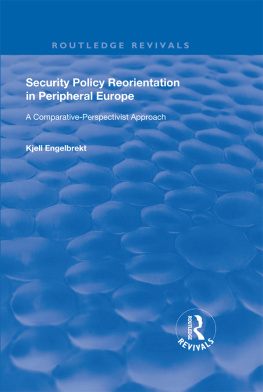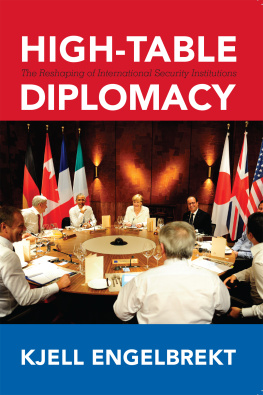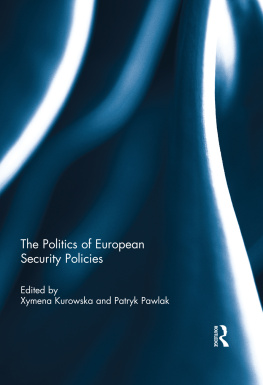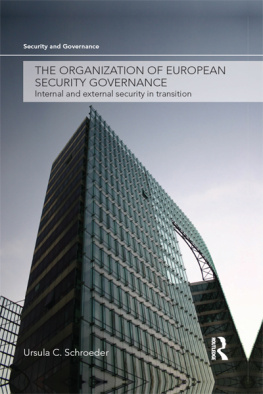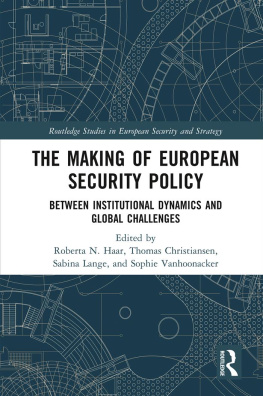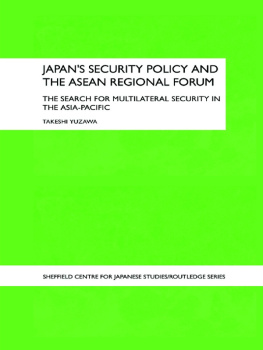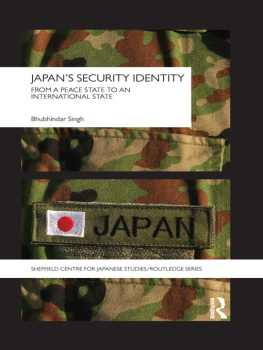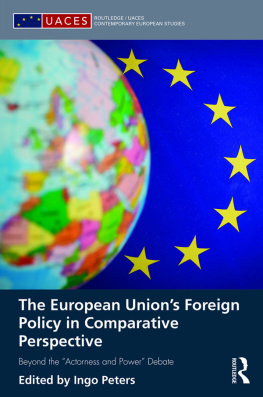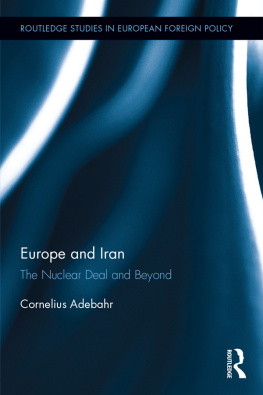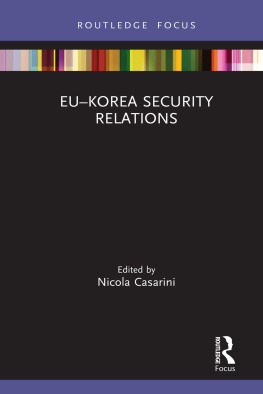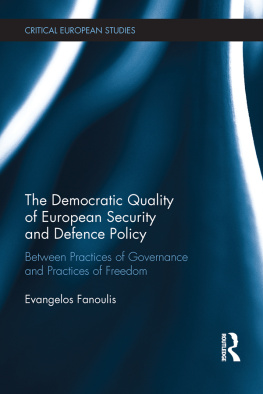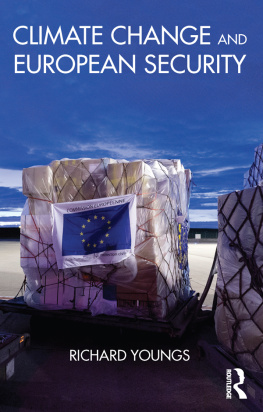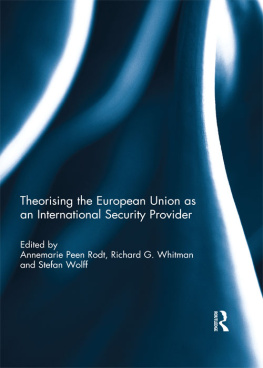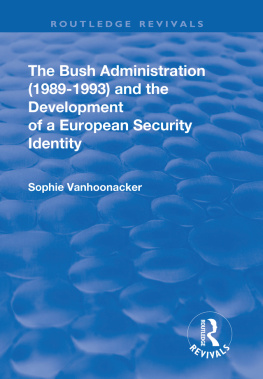SECURITY POLICY REORIENTATION IN PERIPHERAL EUROPE
To
Dora Ida Sophia,
her mother,
and both of
her grandmothers
First published 2002 by Ashgate Publishing
Reissued 2019 by Routledge
2 Park Square, Milton Park, Abingdon, Oxon, OXl 4 4RN
52 Vanderbilt Avenue, New York, NY 10017
Routledge is an imprint of the Taylor & Francis Group, an informa business
Kjell Engelbrekt 2002
The Author has asserted his right under the Copyright, Designs and Patents Act, 1988, to be identified as the Author of this Work.
All rights reserved. No part of this book may be reprinted or reproduced or utilised in any form or by any electronic, mechanical, or other means, now known or hereafter invented, including photocopying and recording, or in any information storage or retrieval system, without permission in writing from the publishers.
Notice:
Product or corporate names may be trademarks or registered trademarks, and are used only for identification and explanation without intent to infringe.
Publishers Note
The publisher has gone to great lengths to ensure the quality of this reprint but points out that some imperfections in the original copies may be apparent.
Disclaimer
The publisher has made every effort to trace copyright holders and welcomes correspondence from those they have been unable to contact.
A Library of Congress record exists under LC control number:
ISBN 13: 978-1-138-72015-2 (hbk)
ISBN 13: 978-1-315-19516-2 (ebk)
BSP | Bulgarian Socialist Party |
CE | Council of Europe |
CFE | Conventional Forces in Europe |
CMEA | Council of Mutual Economic Assistance |
CSCE | Conference on Security and Cooperation in Europe (renamed OSCE in 1995) |
EC | European Community (broadened its scope to become the EU in 1994) |
ECU | European Currency Unit |
EU | European Union |
EUREKA | European Research Coordinating Agency |
FBIS | Foreign Broadcast and Information Service |
FCMA | Friendship and Mutual Assistance Agreement |
FRG | Federal Republic of Germany |
GDP | Gross Domestic Product |
GDR | German Democratic Republic |
GNP | Gross National Product |
IISS | International Institute for Strategic Studies |
IMF | International Monetary Fund |
IMRO | Internal Macedonian Revolutionary Organization |
JNA | Jugoslovenska Narodna Armija (Yugoslav Peoples Army) |
KGB | Komitet Gosudarstvennyj Bezopasnosti (Committee of State Security) |
NAC | North Atlantic Council |
NACC | North Atlantic Cooperation Council |
NATO | North Atlantic Treaty Organization |
NPT | Nuclear Proliferation Treaty |
OECD | Organization for Economic Cooperation and Development |
OEEC | Organization for European Economic Cooperation (renamed OECD in 1960) |
OSCE | Organization for Security and Cooperation in Europe |
PASOK | Panhellenic Socialist Movement |
PFP | Partnership for Peace |
PKK | Communist Party of Kurdistan |
SAAB | Swedish Automobile Limited |
SFRY | Socialist Federative Republic of Yugoslavia |
SIPRI | Stockholm International Peace Research Institute |
START | Strategic Arms Reduction Treaty |
UDF | Union of Democratic Forces |
UN | United Nations |
UNPROFOR | United Nations Protection Force |
USSR | Union of Soviet Socialist Republics |
WEU | Western European Union |
WTO | Warsaw Treaty Organization |
Are the following two thoughts compatible? Several years back, having been aware of the true size of the task I undertook in starting to write this book, I most likely would have reconsidered. Yet today, knowing the exact price I had to pay to complete it, I cannot regret it.
It is a rationality paradox of sorts. One can argue that the person who several years back misjudged the effort that would be required in fact had been right to abandon his or her ambitious scientific enterprise. But one may just as well assert the person who eventually turned out satisfied is correct when he or she in retrospect can reaffirm the initial choice. This underscores the old academic wisdom that the value or significance of an intellectual journey can never be anticipated before its completion. It is not, I believe, that the satisfaction at the end of the process falls short of or surpasses previous expectations. The experience simply makes previous expectations obsolete and transcends them. It is also the reason why scholars tend to repeat what many decisionmakers find a tedious demand, namely that a large portion of research funding ought to be funnelled into basic and not applied research.
Speaking of expectations, research is often made out to be a lonely enterprise. For my part, I cannot say that this has been the overwhelming impression. Perhaps it has something to do with my own familys inclination not to conceal but to scrutinize everybodys professional (as well as private) problems, and to do so collectively. But I must also admit that I have always felt a member of a wider research community, both in the local sense, and through my relations with colleagues abroad and overseas.
Beginning with the local community, I am first of all grateful to all my friends and colleagues at the Department of Political Science, University of Stockholm, for their support and collaboration throughout the 1990s. For their help with comments and ideas in connection with this project, I would particularly like to thank Lisbeth Aggestam, Hans Agn, Jens Bartelson (now University of Copenhagen), Andreas Behnke, Maud Eduards, Maria Heilman, Ersun Kurtulus, Bo Lindensj, Ulrika Mrth, Bertil Nygren, Lucas Pettersson, Magnus Reitberger, Kristina Riegert (now South Stockholm University College), Merrick Tabor, Charlotte Wagnsson (now National Defense College), Jacob Westberg, and Mike Winnerstig (now Swedish Defense Studies Institute). In particular, Kjell Goldmann on several occasions provided a careful blend of subtle hints and incisive, forthright criticism.
Widening the circle beyond Stockholm, I wish to extend my gratitude to Ulf Bjereld at Gothenburg University, Jeffrey Checkel of ARENA (Oslo), Beate Kohler-Koch of the University of Mannheim, John W. Meyer of Stanford University, Antonio Missiroli of the WEU Institute for Security Studies, Hans Mouritzen of the Danish Institute of International Affairs and Antje Wiener of the University of Hannover, who at one point or another all contributed with a range of important remarks. While I have not always accommodated this text to their advice and sometimes profoundly critical comments, I am deeply grateful for their efforts and serious consideration of various portions of this book.

